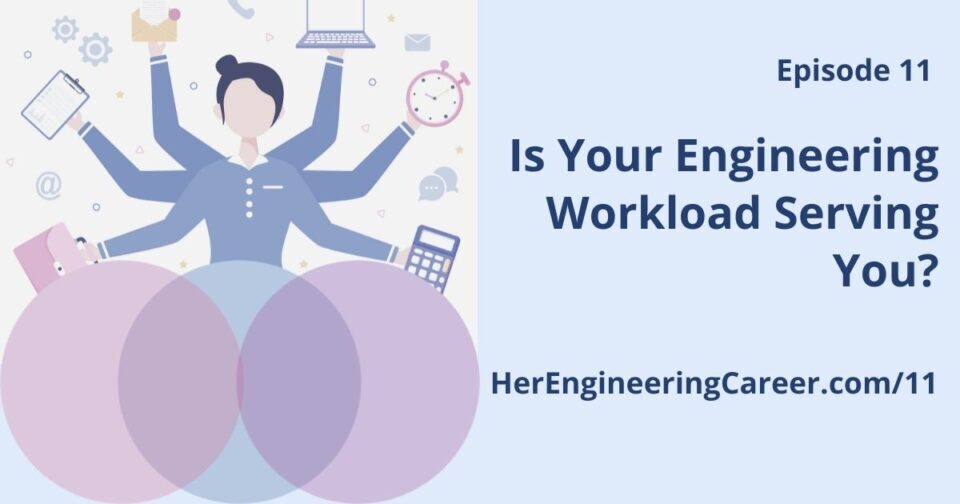Show Notes
In this episode I’m continuing our theme of skills for women engineers. Today we’re featuring workload management.
I think managing workload is especially important for women engineers because we put a lot of value on work-life balance.
Also because we need to overcome the prove-it-again bias pattern: that is, we feel we must do twice as much work in order to be perceived as competent. Does that ring true for you?
Workload management means paying attention to what’s on your plate, that is, to the tasks you’re being assigned and taking on at work.
It means ensuring your workload includes a balance of appropriate tasks. Building it up when you have too much idle time or not enough challenge. And – more commonly – paring it down when it’s out of balance or when you have more than your fair share of work.
Many women engineers assume that someone else (like a boss) is managing their workloads for them. Many think they don’t have the authority to control their own workloads. And many believe they must do every task on their plates.
But these are myths. You have more control over your workload than you think.
Who is Managing Your Engineering Workload?
Early-career engineers typically have more support and oversight from bosses, mentors, or coworkers. Their workloads tend to be at least partially controlled by others. It certainly makes sense to let someone else manage your workload for you while you’re learning the ropes.
But in engineering you start to gain autonomy pretty quickly, and at this point you should learn to manage your workload and build the skills to do it well.
If you are already farther along in your career and have not been managing your workload, you can simply start now.
As a professional, managing your workload, at least in part, is one of the expectations of your job. And it’s clearly one way that you can be in charge of your engineering career.
Is Your Engineering Workload Serving You?
Once you realize that you have control over your own workload, it is quite freeing. Just the idea of it reduces stress. Sometimes it seems as though we’re not allowed to control our own workloads, that tasks are given to us and we are expected to do them.
This is partially true in the sense that you should take on your fair share and do what you can to meet the mission. But you are the one who needs to speak up when you’re overwhelmed or when your workload is not also serving you.
Your workload is serving you well when it:
- Keeps you at your Energetic Center (as introduced in Episode 10).
- Enables your career to keep moving forward.
- Ensures you are included in mission accomplishment.
- Enables you to be seen, heard, and recognized.
- Allows you to be yourself and to be well.
Tips for Managing Your Workload
If your workload is not serving you, or you’re working overtime to accomplish it, then that’s a sign to start paring it down. Let’s go over some tips for managing your workload.
- Take things off your plate. A common assumption is that if a task is on your plate it has to be accomplished, and it has to be accomplished by you. In reality, people take things off their plates all the time. You can do this, too. For example,
- Like we discussed in Episode 10, if a task never makes it to the top of your priority list, ask yourself, “What happens if I don’t do it?” And if there are no consequences for not doing the task, then take it out of your job jar.
- If it’s something you don’t have time for or prefer not to do, ask your boss to assign the task to someone else. (This works more times than you think!)
- Find ways to make tasks easier on you. Ask for help, resources, guidance, and/or later deadlines. Maybe the task can be reduced to a smaller one. Or maybe you can get someone to help you with it.
- Ensure you do not have more than your fair share of “extra duties.” Extra duties are those tasks that must get done but are not directly related to your expertise or job description.
For example, if you get stuck chairing the awards luncheon committee, the conference room redesign committee, AND the intern welcoming committee, you should forego at least one of these.
- Tailor your workload to fit your status. Depending where you are in your career and life, your work status changes. If your career is really taking off and you’re able to devote significant energy to your work tasks, then you can probably handle a larger workload.
Most of us spend at least some of our careers in a phase that requires us to focus more on family, health, education, or special projects. You can’t always be on the steep trajectory, so tailor your workload accordingly.
- Say no. Learning to set boundaries and say no is an important leadership skill. If a task does not allow your workload to serve you, then reject it.
Good workload management is essential to getting ahead. It shows that you can handle your work effectively and set priorities to meet the mission. It shows that you have strong leadership potential.
Manage your workload well and you’ll reach your career goals more efficiently, be a more confident engineer and leader, and make a bigger impact.
Since managing your workload is a large part of your engineering career, I’d love to help you more with that. Consider checking out my signature program. If it resonates with you, fill out an application and we can set up a Discovery Call.
Recap: We started by discussing what it means to manage your workload and who is actually in charge of it.
Then we addressed the question of whether or not your workload is serving you and how you can tell. Lastly, we reviewed how to take things off your plate and other workload management tips.
Next time on Her Engineering Career Podcast we’ll talk about networking and how you can build those skills to help you progress in your engineering career. Please join in for Episode 12.

